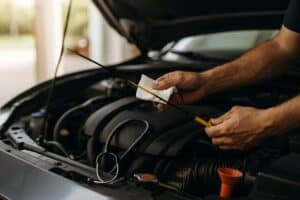Your car’s engine should run smoothly and quietly. If you start hearing knocking or pinging sounds, something’s off. In some cases, it may indicate oil breakdown. This serious issue can lead to costly damage or even legal complications, in which case Cannon Law attorneys may need to become involved.
What Is Engine Knocking?
Engine knocking, also known as detonation, is a rattling or pinging noise that comes from your engine. It often happens when fuel burns unevenly in the combustion chamber. Instead of a smooth ignition, the air-fuel mixture explodes in uncontrolled bursts.
Several things can cause this, but oil breakdown is a common culprit. When motor oil can’t do its job, friction increases, leading to knocking. Ignoring the sound can lead to serious engine damage over time.
You’ll typically hear knocking under acceleration or when your engine is under load. That’s when the pressure and temperature are at their highest.
The Role Of Engine Oil
Engine oil isn’t just for lubrication; it also cools, cleans, and protects the engine’s moving parts. It creates a thin film between components to prevent metal-to-metal contact. Without it, parts grind against each other, wearing out more quickly.
Oil also absorbs heat from the engine. If the oil breaks down, it can’t carry heat away effectively. This leads to overheating and poor performance.
Oil eventually loses its effectiveness due to age, contamination, or excessive heat. That’s when the breakdown begins, and knocking might follow.
Signs Of Oil Breakdown
One of the first signs of oil breakdown is a change in color or texture of the oil. Fresh oil is golden and smooth; old or degraded oil becomes dark, thick, or gritty. This makes it less effective at protecting your engine.
You might also notice a burning smell or see smoke coming from under the hood. That usually means the oil is burning instead of lubricating.
In some cases, your oil pressure warning light may flicker or stay on. Low oil pressure often accompanies oil that has lost its protective qualities.
How Oil Breakdown Leads To Knocking
When oil loses viscosity, it stops forming a protective layer between engine parts. This causes increased friction, especially in areas such as the crankshaft and piston rings. The extra heat and pressure can cause pre-ignition, which creates that knocking sound.
Thin or broken-down oil also struggles to reach all engine components. This starves some parts of lubrication, making them knock as they work harder to move. In short, if your oil can’t protect your engine, the resulting metal-on-metal contact creates the perfect environment for knocking to occur.
How To Recognize Knocking Sounds
Engine knocking sounds different from normal engine noise. It’s usually a metallic tapping, pinging, or rattling noise. You’ll often hear it most clearly when accelerating or driving up a hill.
The sound may also increase in volume or frequency as the problem gets worse. This is a warning sign that shouldn’t be ignored.
Turn off your music and AC for a moment and listen carefully when you start your car. If something sounds off, especially under load, it’s worth investigating right away.
Other Warning Signs To Watch For
In addition to noise, you might notice poor fuel economy. When the engine isn’t running efficiently, it burns more gas. This often pairs with sluggish acceleration or rough idling.
You may also see increased exhaust smoke or a check engine light. These signs suggest your engine is struggling—possibly due to oil breakdown or other issues.
Even if the sound goes away temporarily, it can return worse later. Addressing it early could save you from engine failure.
Preventing Engine Knocking
The best way to prevent knocking caused by oil breakdown is to follow a regular oil change schedule. Use high-quality oil that matches your manufacturer’s specifications. Using cheap or incorrect oil types can lead to premature breakdown and reduced protection.
Also, regularly monitor your oil levels and the condition of your vehicle. If you drive in extreme conditions—like very hot or cold weather—you may need more frequent oil changes.
Keeping your engine tuned and your fuel system clean also helps. Detonation is less likely in a well-maintained engine with clean fuel and good lubrication.
Final Thoughts
Engine knocking is more than just an annoying sound—it’s a sign that your engine might be in trouble. If it’s caused by oil breakdown, the damage can be serious. Staying on top of maintenance can help you avoid expensive repairs. And if you’re facing engine failure after a service mistake or manufacturer defect, Cannon Law attorneys can help you explore your legal options.






